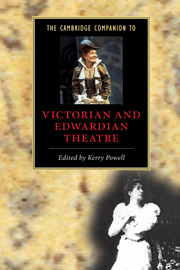Book contents
- Frontmatter
- Part 1 Introduction
- Part 2 Performance and context
- Part 3 Text and context
- 7 Comedy and farce
- 8 Encountering melodrama
- 9 The music hall
- 10 Theatre of the 1890s
- 11 New theatres for a new drama
- 12 The fallen woman on stage
- 13 Reimagining the theatre
- 14 The East-End theatre
- Select bibliography
- Index
- Series List
12 - The fallen woman on stage
maidens, magdalens, and the emancipated female
from Part 3 - Text and context
Published online by Cambridge University Press: 28 May 2006
- Frontmatter
- Part 1 Introduction
- Part 2 Performance and context
- Part 3 Text and context
- 7 Comedy and farce
- 8 Encountering melodrama
- 9 The music hall
- 10 Theatre of the 1890s
- 11 New theatres for a new drama
- 12 The fallen woman on stage
- 13 Reimagining the theatre
- 14 The East-End theatre
- Select bibliography
- Index
- Series List
Summary
Having dominated French theatre for over two decades, at the end of the nineteenth century the fallen woman became an ever-present figure on the English stage. In 1873 Henry James declared in disgust, “Just as the light drama in France is a tissue of fantastic indecencies, the serious drama is an agglomeration of horrors.” Confronted by a string of plays by Alexandre Dumas fils, Sardou and Augier, which variously enjoined husbands to chastize, forgive, banish or shoot their unfaithful wives, James concluded of the French drama that “adultery is their only theme.” A decade later, adulterous heroines still dominated the Parisian stage and threatened to extend their influence across the channel. The intellectual sterility of the British stage was such, warned George Bernard Shaw in 1885, that “we look on French dramatists as bold grapplers with social problems because their heroines sometimes commit adultery. Some of our own critics and playwrights, when lauding the French drama, occasionally express themselves in a manner that indicates their conviction that a little adultery would purify and ennoble the British stage.” But, he hastened to add, “Our drama is sinking for want, not of an Augier, but of an Ibsen.” His warnings were in vain. Dramas centring on adultery, seduction, and the issue of the sexual double standard became a staple of the London stage, so that by 1905 J. M. Barrie could write a comedy, Alice Sit-by-the-Fire, in which the inevitable affect of theatregoing on a young girl’s imagination is to make her believe that her mother must have a lover.
- Type
- Chapter
- Information
- The Cambridge Companion to Victorian and Edwardian Theatre , pp. 222 - 236Publisher: Cambridge University PressPrint publication year: 2004
- 3
- Cited by



